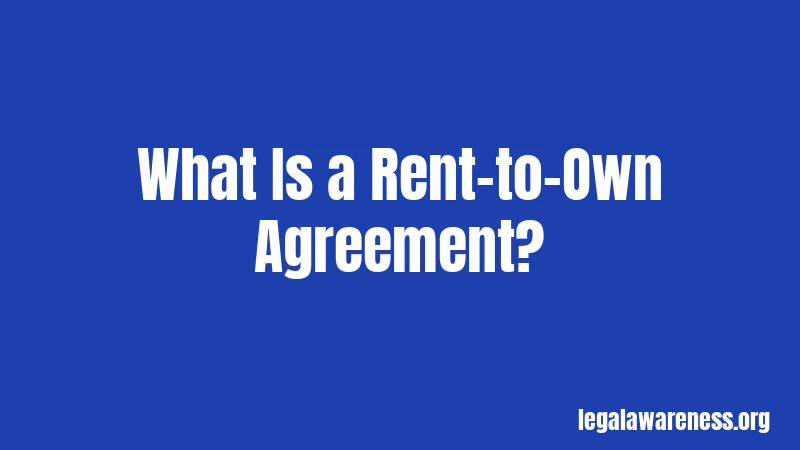Rent-to-Own Laws in Texas (2026): What You Need to Know
Rent-to-own agreements offer a unique path to homeownership for people who may not qualify for traditional mortgages. These arrangements let you rent a home while building toward ownership. However, Texas has strict laws that protect both buyers and sellers in these complex agreements.
Understanding these laws is crucial before entering any rent-to-own contract. This guide explains everything you need to know about Texas rent-to-own laws as of 2025.
What Is a Rent-to-Own Agreement?

A rent-to-own agreement is a special contract that combines renting and buying. You rent a home for a set period with the option or requirement to buy it later. These agreements are also called lease-option or lease-purchase contracts.
In Texas, rent-to-own deals that last longer than 180 days are considered “executory contracts.” This means they fall under strict state regulations in the Texas Property Code Chapter 5. The law exists to protect buyers from unfair practices that were common in the past.
Basic Rent-to-Own Laws
Contract Requirements
Texas law requires all rent-to-own agreements to be in writing and signed by both parties. Oral agreements are not enforceable and will not hold up in court.
The contract must last longer than six months or 180 days to qualify as an executory contract. The property must be used mainly as a residence. The buyer and seller cannot be close family members like parents, children, grandparents, or siblings.
Two Main Types of Agreements
Lease-Option Agreements give you the choice to buy the property when the lease ends. You are not required to purchase the home. This offers more flexibility but less security for the seller.
Lease-Purchase Agreements require you to buy the property when the lease term ends. This is a legally binding commitment to purchase. Both types involve an upfront option fee and monthly rent payments.
Seller Disclosure Requirements

Property Information
Sellers must provide detailed information before you sign any contract. They must give you a recent property survey that is less than one year old. You must receive copies of all liens, restrictions, and easements affecting the property.
The seller must provide tax certificates from each entity that collects taxes on the property. They must also give you copies of any insurance policies and explain what is covered.
Financial Terms
Sellers must clearly explain all financial terms before you sign. This includes the total purchase price, interest rates, and any late charges. They must tell you that no prepayment penalties apply if you want to pay early.
The contract must include exact wording about oral agreements not being enforceable. Failing to include this warning can be considered a deceptive practice under Texas law.
Contract Filing and Recording
30-Day Filing Requirement
Most executory contracts must be recorded with the county clerk within 30 days of signing. This recording triggers important protections for buyers. A recorded contract usually requires full foreclosure instead of simple eviction if you default.
Not all sellers follow this recording requirement. The penalties for failing to record are minimal. However, sellers who do not record may face other legal consequences.
Benefits of Recording
Recording your contract provides important protections. It creates a public record of your agreement. It also triggers equity protections if you have paid 40% of the purchase price or made 48 months of payments.
Penalties and Consequences

Seller Violations
Sellers who violate Texas rent-to-own laws face serious penalties. Failing to provide required disclosures is considered a deceptive practice under Texas law. This can result in treble damages plus attorney fees for buyers.
Sellers must also provide annual accounting statements every January. These statements must show all payments received, insurance proceeds collected, and changes in coverage. Failing to provide these statements can result in penalties and attorney fees.
Buyer Protections
Texas law gives buyers several important protections. You have the right to cancel any executory contract within 14 days for any reason. This applies even if the seller has followed all legal requirements.
If you default on payments, you may still have equity protection. This applies if you have paid 40% of the sale price or made 48 months of payments. The property may need to go through foreclosure instead of simple eviction.
Special Circumstances
Cancellation Rights
You can cancel any rent-to-own contract within 14 days of signing without giving a reason. The seller must provide a full refund of all payments made. However, you may need to pay for your use of the property during that time.
Cancellation after 14 days requires mutual restoration. This means both parties must return what they received from the other party.
Default and Eviction
If you miss payments or violate the contract, the seller can take action to end the agreement. However, they must follow specific legal procedures. They cannot simply evict you like a regular tenant.
For contracts that qualify for equity protection, the seller must go through foreclosure proceedings. This provides more protection than simple eviction but takes longer to complete.
How to Enter a Rent-to-Own Agreement
Finding Properties
Start by looking for properties that offer rent-to-own options. Many investors and some homeowners offer these arrangements. You can also approach property owners directly to discuss the possibility.
Work with a real estate agent who understands rent-to-own agreements. They can help you find suitable properties and navigate the complex legal requirements.
Negotiating Terms
Negotiate all terms carefully before signing any agreement. This includes the option fee, monthly rent amount, and final purchase price. Decide how much of your monthly payment will go toward the purchase price.
Set clear timelines for when you must exercise your option to buy. Make sure all maintenance responsibilities are clearly defined in the contract.
Legal Review
Always have a qualified attorney review any rent-to-own contract before signing. These agreements are complex and contain many legal requirements. An attorney can help you understand your rights and obligations.
Make sure the contract complies with all Texas Property Code requirements. Check that all required disclosures are included and properly worded.
Recent Law Changes in 2025
Enhanced Disclosure Requirements
Texas has strengthened disclosure requirements for all rental agreements in 2025. Landlords must now provide more detailed information about property conditions and defects. This applies to rent-to-own agreements as well as traditional rentals.
Property owners must disclose any known problems with the property before leasing. This includes structural issues, pest problems, or maintenance needs.
Extended Notice Periods
New Texas laws require longer notice periods for rent increases and lease changes. For rent-to-own agreements, this means sellers must give more advance notice of any modifications to payment terms.
The extended notice periods help ensure tenants have adequate time to understand and respond to changes in their agreements.
Resources for Help
Legal Assistance
Texas RioGrande Legal Aid provides free legal services to low-income residents. They can help with rent-to-own questions, contract reviews, and dispute resolution. They have offices throughout Texas and offer both English and Spanish services.
The State Bar of Texas Lawyer Referral Service can help you find qualified attorneys who specialize in real estate law. Many attorneys offer initial consultations at reduced rates.
Government Resources
The Texas Attorney General’s Consumer Protection Division handles complaints about deceptive practices. You can file complaints online or by phone if you believe a seller has violated the law.
The Texas Department of Housing and Community Affairs provides information about housing programs and tenant rights. They also offer resources for first-time homebuyers.
Frequently Asked Questions
Do I need a lawyer for a rent-to-own agreement?
While not legally required, having a lawyer review any rent-to-own contract is highly recommended. These agreements are complex and contain many technical legal requirements that can affect your rights.
Can the seller change the purchase price during the contract?
No, the purchase price should be fixed when you sign the original agreement. Sellers cannot change the price unless both parties agree in writing to modify the contract.
What happens if I cannot get financing at the end of the lease?
This depends on whether you have a lease-option or lease-purchase agreement. With a lease-option, you can walk away but will lose your option fee and any rent credits. With a lease-purchase, you are still required to complete the purchase.
Can I make improvements to the property during the lease?
You should only make improvements with written permission from the seller. The contract should specify who is responsible for maintenance and improvements during the lease period.
What if the seller does not maintain the property properly?
Sellers in rent-to-own agreements have the same maintenance obligations as traditional landlords. You can request repairs and may be able to deduct repair costs from rent in certain situations involving health and safety issues.
Final Thoughts
Rent-to-own agreements can provide a path to homeownership for people who need time to improve their credit or save money. However, these contracts are complex and come with significant risks and responsibilities for both buyers and sellers.
Texas law provides important protections, but you must understand your rights and obligations before signing any agreement. Always work with qualified professionals and carefully review all contract terms. Remember that you have 14 days to cancel any executory contract for any reason.
With proper preparation and legal guidance, rent-to-own agreements can be a valuable tool for achieving homeownership in Texas.
